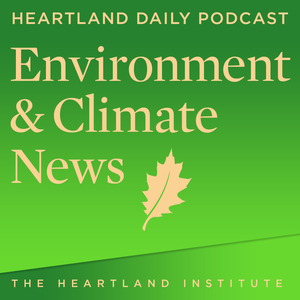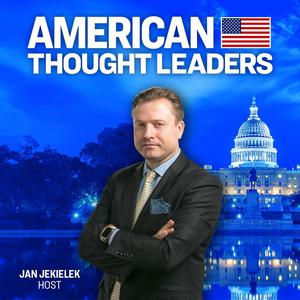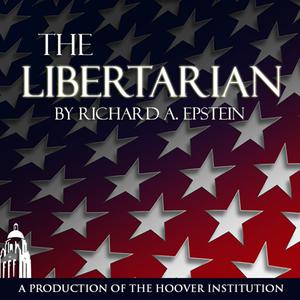
Environment and Climate News Podcast
Heartland Institute
The Heartland Institute podcast featuring scientists, authors, and policy experts who take the non-alarmist, climate-realist position on environment and energy policy.
- 1 hour 1 minuteSuing Big Oil for LA Fires is All Wet - The Climate Realism Show #143
The historic and devastating fires in Los Angeles exposed the incompetence of leaders such as Gov. Gavin Newsom and Mayor Karen Bass. So how do state legislators want to address that? By allowing victims who had their lives destroyed sue Big Oil. Of course. The Heartland Institute’s Anthony Watts and Jim Lakely blow holes in that absurd political stunt and also discuss other recent to abuse the courts to push climate alarmism.
Also, Lee Zeldin has just started his first week as administrator of the Environmental Protection Agency, and already the environmental left is terrified that the days of considering human emissions of carbon dioxide are coming to an end. We will dig deeper into the EPA’s “endangerment finding” for CO2 and whether it can be overturned in the next four years. We will also cover some of the “Crazy Climate News of the Week.”
31 January 2025, 7:39 pm - 1 hour 22 minutesMaking Climate Policy Sane Again - The Climate Realism Show #142
President Trump wasted no time after his inauguration on Monday reversing all of his predecessor’s executive orders that made climate alarmism and “green” energy the focus of American government. He didn’t just reverse bad policies, and pull us out of the Paris Climate Agreement, he went farther than he did in his first term to ramp up American energy production and rein in an Environmental Protection Agency that regulated far beyond its mandate. Among at least 47 climate- and energy-related EOs signed in the first 24 hours of his swearing-in was one tackling what has long served as the keystone of limitless environmental regulation: the “endangerment finding” for carbon dioxide emissions. May we finally see the end of the EPA’s abuse of its regulatory power?
The Heartland Institute’s Anthony Watts, Sterling Burnett, Linnea Lueken, and Jim Lakely are joined by special guest Myron Ebell, who was on President Trump’s EPA Transition Team for his first term to break down what these reversals of radical climate and energy policy will mean for America and the world. We will also cover some of the Crazy Climate News of the Week.
24 January 2025, 7:54 pm - 1 hour 20 minutesTrump’s Climate Cabinet - The Climate Realism Show #141
Senate committee rooms on Capitol Hill were buzzing with activity this week as many of President Trump’s picks for cabinet posts were underway. Three of the key hearings on climate and energy policy were Lee Zeldin for EPA, Doug Burgum for Interior, and Chris Wright for Energy. We hope you caught Heartland’s two three-hour long “watch parties” with gavel-to-gavel coverage this week, but there’s still more to examine. What did the hearing performances of Trump’s picks say about how they will serve in their roles? Which federal agency of the three needs the most work to change its purpose? And can these appointments succeed in carrying out Trump’s agenda in the face of a deeply entrenched federal bureaucracy that is opposed to almost all of Trump’s major climate and energy goals?
The Heartland Institute’s Anthony Watts, H. Sterling Burnett, Linnea Lueken, and Jim Lakely will dive deeper into that topic. Plus, we’ll review some of the Crazy Climate News of the Week, including a deep freeze that’s on the way for most of the continental United States.
17 January 2025, 9:12 pm - 1 hour 35 minutesLA Fires NOT Caused by Climate Change - The Climate Realism Show #140
Historic wildfires have destroyed thousands of homes and businesses in Los Angeles County. Many homes of the rich and famous in Pacific Palisades, Malibu, and Pasadena have been reduced to rubble and ash. Entire neighborhoods were completely destroyed, and the fires have been blamed for at least five deaths. The speed at which the fires spread caught firefighters and residents off guard. Fed by hurricane-strength Santa Ana winds, embers were flying through the air seemingly everywhere and with no let-up. Climate alarmists have pinned the blame on human-caused climate change, but that is not truth.
On Episode #140 of The Climate Realism Show, The Heartland Institute’s H. Sterling Burnett, Anthony Watts, Linnea Lueken, and Jim Lakely welcome U.S. Rep. Doug LaMalfa (R-CA) and CFACT’s Chris Martz to cover the LA fires and some of the “Crazy Climate News of the Week.” There’s been some fascinating news since our two-week hiatus, some of it good. Blackrock and JP Morgan are the latest financial giants to drop out of the Net-Zero Banking Alliance, Michael Mann experienced his first-ever setback in his lawfare against climate realists, and Biden tries to tie Trump’s hands on drilling while also trying to ban some tankless water heaters on his way out of the White House.
10 January 2025, 9:49 pm - 7 minutes 28 secondsBiden’s Green Programs Fraudulent, Wasteful, and Abusive
Join us for a hard-hitting discussion with Dr. Sterling Burnett, director of the Robinson Center on Climate and Environmental Policy at The Heartland Institute, as he breaks down the recent Energy Department Inspector General's explosive findings. In this episode, Dr. Burnett examines claims of fraud, waste, and abuse in current federal green energy programs, offering his perspective on the path forward. He discusses the implications of these findings and presents his case for both executive and congressional action to address what he characterizes as problematic spending. Dive deep into this complex intersection of energy policy, government oversight, and fiscal responsibility with one of the field's leading voices.
23 December 2024, 6:43 pm - 1 hour 21 minutesHuman CO2 Emissions Are a GOOD THING - The Climate Realism Show #139
It’s a fact that humans are increasing the concentration of carbon dioxide in the atmosphere. But does it follow, as we’re constantly told, that this increasing of CO2 is poisoning the planet? What if the opposite is actually the case? This week’s guest, CO2 Coalition Executive Director Gregory Wrightstone, is going to explain why it’s not true that more CO2=Bad.
On Episode #139 of The Climate Realism Show, The Heartland Institute’s H. Sterling Burnett, Jim Lakely, and Wrightstone will also cover some of the “Crazy Climate News of the Week.” An op-ed in The New York Times says climate change should make you rethink home ownership. Remember when an iceberg off Antarctica in 2017 was supposed to freak you out? Well, never mind. And the World Economic Forum says you should wash your clothes less to save the planet. They suggest washing jeans once a month and pajamas just once a week. Is there any aspect of our lives that the climate scolds will ignore? Apparently not.
LINKS
The European Conservative: Are Net Zero’s Days Numbered?
https://europeanconservative.com/articles/commentary/are-net-zeros-days-numbered/CO2 Coalition
https://co2coalition.org/VISIT THESE GREAT CLIMATE REALISM SITES
SUBSCRIBE to Heartland's Climate Change Weekly
https://heartland.org/subscribe/ClimateRealism
https://climaterealism.com/Climate at a Glance
https://climateataglance.com/Energy at a Glance
https://energyataglance.com/The Heartland Institute's Climate Page
https://heartland.org/topics/environment-energy/Heartland's Climate Conferences
https://climateconferences.heartland.org/OUR STREAMING PARTNERS
Watts Up With That
https://wattsupwiththat.com/CFACT
https://www.cfact.org/ClimateDepot
https://www.climatedepot.com/JunkScience
https://junkscience.com/20 December 2024, 8:38 pm - 26 minutes 1 secondH. Sterling Burnett on Climate Policy and America's Energy Future
In this episode of The Heartland Daily Podcast, Karen Schoen is joined by H. Sterling Burnett, Director of the Arthur B. Robinson Center on Climate and Environmental Policy and Managing Editor of Environment & Climate News. Together, they dive into the critical issues shaping America’s energy future and environmental policies.
Burnett shares his expert insights on:
- Why the Paris Climate Treaty was never about the climate and how to put an end to it.
- The case for repealing the Biden administration's electric vehicle mandates and revitalizing oil, gas, and coal production.
- How offshore wind projects threaten consumers, ecosystems, and coastal communities.
- The importance of regulatory reform to promote transparency and restore common sense in environmental policy.
Join us for a compelling discussion packed with actionable ideas and bold strategies for a prosperous, energy-independent America. H. Sterling Burnett brings unparalleled expertise to the conversation, making this a must-listen episode for anyone concerned about the future of climate and energy policy.
This episode features audio from The Prism of America’s Education podcast, hosted by Karen Schoen.
18 December 2024, 10:37 pm - 1 hour 21 minutesIs Elon Musk Now a Climate Realist? - The Climate Realism Show #138
Elon Musk’s latest fortune was built on his Tesla electric vehicles, helped in no small measure by federal tax credits so more people could afford to buy the luxury items. For years, he’s marketed them as a way to help wean the world of oil and stop the imminent “climate change meltdown.” But The Washington Post reports that Musk’s abandonment of left-wing, trendy, virtue-signaling political views not only eventually led him to Donald Trump, but maybe out of the Climate Cult, altogether. And if Musk makes it OK to leave, will more prominent business leaders and cultural trend setters soon follow?
On Episode #138 of The Climate Realism Show, The Heartland Institute’s H. Sterling Burnett, Anthony Watts, Linnea Lueken, and Jim Lakely will cover that story, as well as some of the “Crazy Climate News of the Week.” Did you know the Chinese Communist Party is sending lots of money to “green energy” groups and support energy groups and universities in the United States? The UK’s obsession with reaching “Net Zero” is putting its military in danger on the battlefield. And you’re not going to want to miss what is perhaps the dumbest question ever asked by an anchor on CNN.
Join us LIVE at 1 p.m. ET so you can leave your questions and comments for the show in the chat.
13 December 2024, 8:47 pm - 23 minutes 39 secondsTop 10 Energy Priorities for America's Future
Join Sterling Burnett of The Heartland Institute as he delves into the critical intersection of climate policy and energy independence. This three-part series examines “Top 10 Climate and Energy Action Items for President Trump in His Second Term,” exploring the challenges posed by green energy policies under the Biden administration.
From the impacts of the Paris Climate Accords to the future of oil and gas leasing, Burnett provides thought-provoking insights on maintaining affordable, reliable energy for all Americans. Whether you're passionate about climate policy or seeking clarity on energy debates, this podcast unpacks the issues with expert analysis and actionable ideas.
Stay informed with Environment and Climate News—your resource for discussions that shape the future of energy and the environment.
11 December 2024, 7:41 pm - 1 hour 21 minutesEPA’s Big Green Money Scam
The investigative journalists at Project Veritas have a new scoop. President Biden’s Environmental Protection Agency is reacting to soon losing power by shoveling tens of billions of your tax dollars out the door to left-wing “green” nonprofits. “”We’re throwing gold bars off the Titanic,” said Brent Efron, Special Advisor for Implementation, EPA. “We’re getting the money out.” Again, that’s your money.
On Episode #137 of The Climate Realism Show, The Heartland Institute’s H. Sterling Burnett, Anthony Watts, Linnea Lueken, and Jim Lakely cover this outrageous story. They also cover the “Crazy Climate News of the Week,” including how gamers are “fighting climate change,” how the BRICS countries are thumbing their noses at the climate cult at the United Nations, and more.
Join us LIVE every Friday at 1 p.m. ET for The Climate Realism Show so you can join the chat and be part of the show.
7 December 2024, 4:42 am - 1 hour 20 minutesCOP 29: Inside the Disaster in Baku - The Climate Realism Show #136
The latest annual United Nations climate conference, COP29, is about to wrap up in Baku, Azerbaijan – the second year in a row it has been held in a “petro state.” Add in the election of Donald Trump just before they convened, and it was a pretty grim affair if you are a global climate alarmist. But for some people it was a blast, including Craig Rucker and Marc Morano of CFACT, who attended as they usually do. They will provide us a report from the ground on what even supporters of the global climate command-and-control agenda are admitting was a disaster.
On Episode #136 The Heartland Institute’s H. Sterling Burnett, Linnea Lueken, and Jim Lakely will also cover some of the Crazy Climate News of the week.
22 November 2024, 10:05 pm - More Episodes? Get the App
Your feedback is valuable to us. Should you encounter any bugs, glitches, lack of functionality or other problems, please email us on [email protected] or join Moon.FM Telegram Group where you can talk directly to the dev team who are happy to answer any queries.
 Uncommon Knowledge
Uncommon Knowledge
 Quillette Podcast
Quillette Podcast
 American Thought Leaders
American Thought Leaders
 Power Hour with Alex Epstein
Power Hour with Alex Epstein
 Libertarian
Libertarian
 Federalist Radio Hour
Federalist Radio Hour